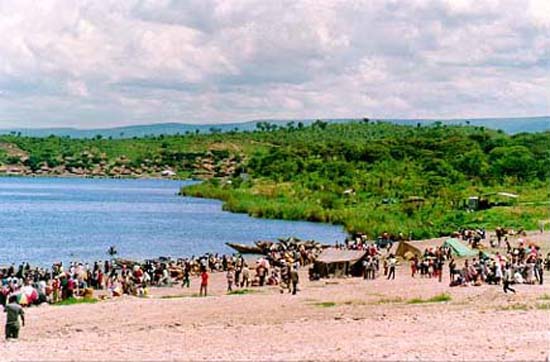2006.07.09: July 9, 2006: Headlines: COS - Zambia: Pittsburgh Post Gazette: Zambia RPCV Jeff Rhodes served in Chipungu, a village of about 1,500, which includes a clinic and commercial farming block
Peace Corps Online:
Directory:
Zambia:
Peace Corps Zambia :
The Peace Corps in Zambia:
2006.07.09: July 9, 2006: Headlines: COS - Zambia: Pittsburgh Post Gazette: Zambia RPCV Jeff Rhodes served in Chipungu, a village of about 1,500, which includes a clinic and commercial farming block
Zambia RPCV Jeff Rhodes served in Chipungu, a village of about 1,500, which includes a clinic and commercial farming block

A typical work day for Mr. Rhodes involves helping a nurse with paperwork or with education programs such as immunization or nutrition. The whole purpose, of the Peace Corps, he said, is to show Zambians ways they can directly and specifically help themselves, said Mr. Rhodes, who has nine months of service left.
Zambia RPCV Jeff Rhodes served in Chipungu, a village of about 1,500, which includes a clinic and commercial farming block
Peace Corps volunteer shares experiences
He's visiting home from a world away
Sunday, July 09, 2006
By Lynda Guydon Taylor, Pittsburgh Post-Gazette
As he approached his final semester at Ohio University in 2003, Jeff Rhodes was unclear what he wanted to do next. But a chance encounter with a young woman at a party set him on a path he could not have envisioned.
When he asked Carrie, whose last name he never learned, what she was doing, she responded she had just returned from the Peace Corps in Paraguay.
It wasn't long before Mr. Rhodes was talking to a Peace Corps recruiter on campus. He applied in June 2003, but in November of that year, a car accident left him with his left leg broken in two places.
Although he had hoped to start the corps in 2004, his assignment was postponed until January 2005 when it took him to Zambia, a world away from his East Washington roots.
"I'm a pretty big geography geek. I knew where it was but that's about it," he said of the nation of 11 million about the size of Texas.
Home last week for a two-week stay to attend a friend's wedding and reconnect with family, a bearded Mr. Rhodes sat in a wicker chair on the porch of his parents' comfortable red brick home and talked about his experiences.
East Washington is cultures removed from the grass roofed, mud-walled, two-room house he moved to in the stable African country that occasionally hosts refugees from other nations. He had no electricity and no running water, drawing from a well, just like resident villagers.
He stayed with a host family for three months in Kitwe but eventually was assigned to Chipungu, a village of about 1,500, which includes a clinic and commercial farming block. Mr. Rhodes, a journalism and political science major, rose between 5:35 and 6:30 a.m. and retired at dark, often reading himself to sleep by candlelight.
"It's amazing. Essentially you get into a habit of waking up at dawn and falling asleep at dark," he said, a habit that confused his internal clock when he returned home.
He is assigned to assisting the country in health care, or the Community Action For Health Program. An applicant does not know where he is going until he accepts the assignment.
The Zambian government concentrates on six areas of health: malaria, HIV and AIDS, child nutrition, maternal health, tuberculosis and water and sanitation. Although Zambia as a whole has an AIDS rate of 23 to 25 percent, in the villages the disease varies from 10 to 15 percent. Towns and cities, where it is highest, raise the overall rate.
His assignment was to help form and train neighborhood health committees of 10 to 15 people, and assist in educational programs.
"They are essentially village-based volunteers interested in improving the health of their communities," he said.
They survey their villages to determine what disease or diseases are most prevalent, why that is and how to correct it. Most villages are nothing more than an extended family or two, he said.
Rural Chipungu, whose main crop is nshima, a corn that is ground into a fine flour, has a single health center serving 6,395 people. The closest doctor is about 16 miles away. In an emergency, the Zambian Ministry of Health provides ambulance service.
Mr. Rhodes got around on a bicycle, and because of the exercise and different diet ended up losing about 40 pounds.
A typical work day for Mr. Rhodes involves helping a nurse with paperwork or with education programs such as immunization or nutrition. The whole purpose, of the Peace Corps, he said, is to show Zambians ways they can directly and specifically help themselves, said Mr. Rhodes, who has nine months of service left.
"Ultimately if I do my job correctly, I'm not needed," he said.
When he returns from his visit here, he will assume a job as Peace Corps volunteer leader, coordinating volunteers, government officials and nongovernmental organizations. For that job, he already has moved to more urbanized Chipata, whose metropolitan population is about 120,000.
He's also had the opportunity to do some traveling, climbing Mount Kilimanjaro and visiting Zanzibar.
Mr. Rhodes said Zambians have treated him like royalty.
"You are the main attraction most days," said Mr. Rhodes, who received a couple of marriage proposals.
The Zambians have a huge fascination with Western culture in general and American culture specifically, he said. They are fans of martial artist Chuck Norris, wrestling, country music and action movies, asking him how Arnold Schwarzenegger could become a governor after having "killed" so many people. There was an obvious disconnect between Arnold the movie star and Arnold the person.
What surprised him most about Zambians, he said, is how similar they are to Americans in terms of motivation and character traits. He observed some of the same traits among them that he sees in family and friends.
"There's nothing that you can't relate to people about," he said.
The Zambians are soft-spoken and modest people, who because he is an American, assumed he is wealthy. He quickly dispelled the notion however, when he took one man to the hut where he lived.
One problem he had with Zambians, however, was their willingness to say yes to whatever he asked of them, regardless of the request. A positive response, however, did not always translate into action. He attributed it to an interest in making him feel good. He has since learned to ask more than one person to do something, hoping that at least one will show up for the task.
On the whole, he is happy he chose to enroll in the Peace Corps and has already taken the Foreign Service exam. If he passes, that's where his career path will lead him.
"There are those moments when things speak to you . . . it's been the best decision [to join the Peace Corps], he said.
(Lynda Guydon Taylor can be reached at ltaylor@post-gazette.com or at 724-746-8813. )
When this story was posted in August 2006, this was on the front page of PCOL:





Peace Corps Online The Independent News Forum serving Returned Peace Corps Volunteers
 | The Peace Corps is "fashionable" again
The LA Times says that "the Peace Corps is booming again and "It's hard to know exactly what's behind the resurgence." PCOL Comment: Since the founding of the Peace Corps 45 years ago, Americans have answered Kennedy's call: "Ask not what your country can do for you--ask what you can do for your country. My fellow citizens of the world: ask not what America will do for you, but what together we can do for the freedom of man." Over 182,000 have served. Another 200,000 have applied and been unable to serve because of lack of Congressional funding. The Peace Corps has never gone out of fashion. It's Congress that hasn't been keeping pace. |
 | Changing the Face of Hunger
In his new book, Former Congressman Tony Hall (RPCV Thailand) says humanitarian aid is the most potent weapon the United States can deploy against terrorism. An evangelical Christian, he is a big believer in faith-based organizations in the fight against hunger. Members of Congress have recently recommended that Hall be appointed special envoy to Sudan to focus on ending the genocide in Darfur. |
 | PC will not return to East Timor in 2006
Volunteers serving in East Timor have safely left the country as a result of the recent civil unrest and government instability. Latest: The Peace Corps has informed us that at this time, the Peace Corps has no plans to re-enter the country in 2006. The Peace Corps recently sent a letter offering eligible volunteers the opportunity to reinstate their service in another country. |
 | Chris Dodd considers run for the White House
Senator Chris Dodd plans to spend the next six to eight months raising money and reaching out to Democrats around the country to gauge his viability as a candidate. Just how far Dodd can go depends largely on his ability to reach Democrats looking for an alternative to Hillary Clinton. PCOL Comment: Dodd served as a Volunteer in the Dominican Republic and has been one of the strongest supporters of the Peace Corps in Congress. |
 | Vasquez testifies before Senate Committee
Director Vasquez testifies before the Senate Foreign Relations Committee on his nomination as the new Representative to the United Nations Agencies for Food and Agriculture replacing Tony Hall. He has been the third longest serving Peace Corps Director after Loret Ruppe Miller and Sargent Shriver. PCOL Comment: Read our thanks to Director Vasquez for his service to the Peace Corps. |
 | Interview with a Hit Man
RPCV John Perkins says that for many years he was an "economic hit man" in the world of international finance whose primary job was to convince less developed countries to accept multibillion dollar loans for infrastructure projects that left the recipient countries wallowing in debt and highly vulnerable to outside political and commercial interests. In this exclusive interview for "Peace Corps Online," Colombia RPCV Joanne Roll, author of Remember with Honor, talks to Perkins about his Peace Corps service, his relation with the NSA, "colonization" in Ecuador, the consequences of his work, why he decided to speak out, and what his hopes are for change. |
 | Peace Corps stonewalls on FOIA request
The Ashland Daily Tidings reports that Peace Corps has blocked their request for information on the Volkart case. "After the Tidings requested information pertaining to why Volkart was denied the position — on March 2 — the newspaper received a letter from the Peace Corps FOIA officer stating the requested information was protected under an exemption of the act." The Dayton Daily News had similar problems with FOIA requests for their award winning series on Volunteer Safety and Security. |
 | PCOL readership increases 100%
Monthly readership on "Peace Corps Online" has increased in the past twelve months to 350,000 visitors - over eleven thousand every day - a 100% increase since this time last year. Thanks again, RPCVs and Friends of the Peace Corps, for making PCOL your source of information for the Peace Corps community. And thanks for supporting the Peace Corps Library and History of the Peace Corps. Stay tuned, the best is yet to come. |
 | History of the Peace Corps
PCOL is proud to announce that Phase One of the "History of the Peace Corps" is now available online. This installment includes over 5,000 pages of primary source documents from the archives of the Peace Corps including every issue of "Peace Corps News," "Peace Corps Times," "Peace Corps Volunteer," "Action Update," and every annual report of the Peace Corps to Congress since 1961. "Ask Not" is an ongoing project. Read how you can help. |
 | RPCV admits to abuse while in Peace Corps
Timothy Ronald Obert has pleaded guilty to sexually abusing a minor in Costa Rica while serving there as a Peace Corps volunteer. "The Peace Corps has a zero tolerance policy for misconduct that violates the law or standards of conduct established by the Peace Corps," said Peace Corps Director Gaddi H. Vasquez. Could inadequate screening have been partly to blame? Mr. Obert's resume, which he had submitted to the Peace Corps in support of his application to become a Peace Corps Volunteer, showed that he had repeatedly sought and obtained positions working with underprivileged children. Read what RPCVs have to say about this case. |
 | Why blurring the lines puts PCVs in danger
When the National Call to Service legislation was amended to include Peace Corps in December of 2002, this country had not yet invaded Iraq and was not in prolonged military engagement in the Middle East, as it is now. Read the story of how one volunteer spent three years in captivity from 1976 to 1980 as the hostage of a insurrection group in Colombia in Joanne Marie Roll's op-ed on why this legislation may put soldier/PCVs in the same kind of danger. Latest: Read the ongoing dialog on the subject. |
Read the stories and leave your comments.

Some postings on Peace Corps Online are provided to the individual members of this group without permission of the copyright owner for the non-profit purposes of criticism, comment, education, scholarship, and research under the "Fair Use" provisions of U.S. Government copyright laws and they may not be distributed further without permission of the copyright owner. Peace Corps Online does not vouch for the accuracy of the content of the postings, which is the sole responsibility of the copyright holder.
Story Source: Pittsburgh Post Gazette
This story has been posted in the following forums: : Headlines; COS - Zambia
PCOL33533
09


























